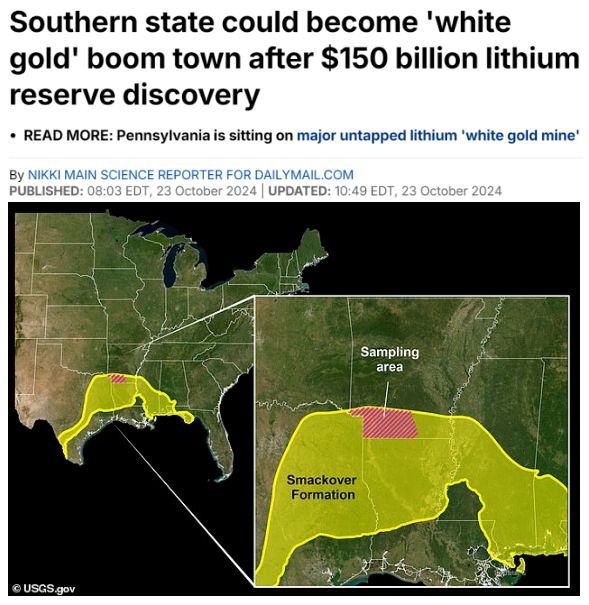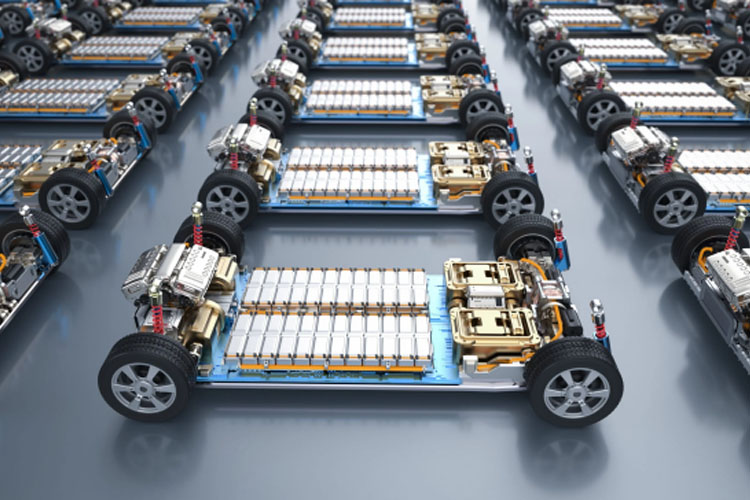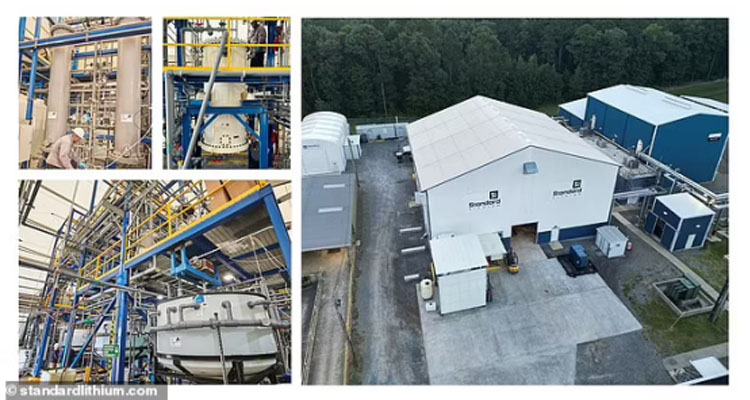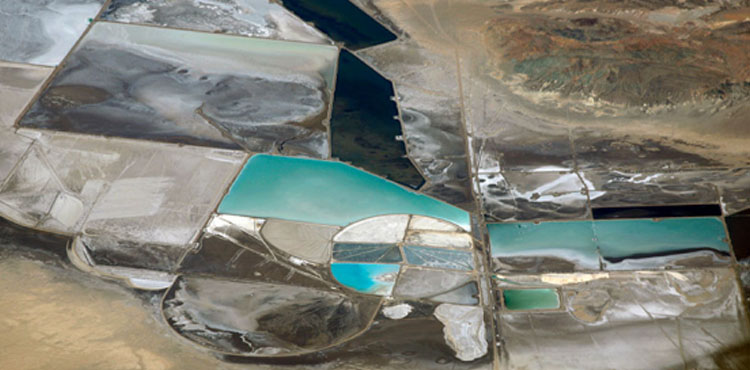According to the United States Geological Survey (USGS), lithium deposits worth up to $150 billion were recently discovered in Arkansas.
This discovery could be the catalyst for a global electric vehicle revolution! Or it can completely meet the global demand for electric vehicle batteries, and even exceed the need for nine times before 2030.
Lithium is an indispensable core raw material for electric vehicle batteries, and the United States has long relied mainly on imported supplies. However, the discovery of lithium is expected to completely break this situation. And provide a more stable supply in the global battery market, promoting the rapid development of the global electric vehicle industry.

Huge lithium deposits found in US
According to the U.S. Geological Survey (USGS), the lithium reserves found in the Smarkwall Formation in Arkansas are between 5 million and 19 million tons, which is enough to meet the demand for electric vehicles in the United States by the end of 2030.
Lithium is an important component of electric vehicle batteries and can often be extracted from saltwater wastewater produced by mines that extract oil and gas. The Arkansas lithium deposit is estimated to be worth $150 billion.
The lithium mine is located in an area rich in oil and bromine deposits with geological history dating back to the Jurassic period, stretching from Texas to Florida, according to USGS geographers.

Professor Kathryn Knierim said: "Our study is the first to estimate the amount of lithium in the southwestern Smarkwall Formation in Arkansas. We estimate that the amount of dissolved lithium in the region is sufficient to meet U.S. lithium import needs, and possibly more."
The USGS study found that if lithium is extracted at the same time as oil and gas are extracted, valuable lithium resources can be captured from substances that would otherwise be considered wastewater.
Professor Knierim explained that the mining infrastructure in the Smawal Formation is mainly related to oil, gas and bromine mining. Lithium can be extracted from the wastewater produced during these mining processes before it is pumped back underground, which has less impact on the environment and is a relatively closed system.
As of 2022, more than 46,000 oil and gas Wells have been drilled in Arkansas.
The researchers used machine learning models to estimate the total amount of lithium in the Smarkwall Formation in Arkansas and created a map of lithium concentrations in the area by comparing data from brine samples with historical data from the USGS Production water database.
Will tram prices drop significantly?
The International Energy Agency (IEA) predicts that demand for lithium will surge in the coming decades as global electric vehicle ownership increases.
Major economies such as China, the United States and the European Union are accelerating lithium mine development and supply chain security. China dominates the global lithium market by investing in overseas mines and lithium processing, while the United States and Europe are boosting domestic lithium production and seeking to diversify supplies.
Usgs Director David Applegate said lithium is a key mineral in the energy transition, and the potential for increased U.S. production to displace imports has implications for jobs, manufacturing and supply chain resilience.

First, abundant lithium resources will reduce dependence on imports, help stabilize the supply chain, and ensure that electric vehicle manufacturers get the necessary raw materials.
Secondly, local production of lithium can reduce battery costs, thus making electric vehicles more affordable and promoting consumer willingness to buy.
In addition, the development of lithium mines will create jobs, boost local economies, and strengthen U.S. competitiveness in the global electric vehicle market. Overall, the findings are expected to accelerate the transition to green transportation in the United States.
Last year, Exxon Mobil Corporation drilled its first lithium well in Arkansas and acquired rights to 120,000 acres of land.
The company plans to start lithium production in 2027 and expects to produce enough lithium to supply more than a million electric vehicles by 2030.

"South Arkansas is the integrated energy hub of our state, producing oil, natural gas and now lithium thanks to investments like ExxonMobil and its unique technological capabilities," Arkansas Governor Sarah Huckabee Sanders said.
"My administration supports a comprehensive energy strategy to ensure Arkansas creates good-paying jobs, and we will continue to cut taxes and red tape to make that happen," she added.
Mining concerns for the environment
Gov. Huckabee Sanders hasn't made clear what policies he would push for lithium mining in Arkansas, but companies like ExxonMobil are pursuing more expensive extraction methods. One of these methods is direct lithium extraction (DLE), which is the extraction of lithium from the waste stream of salt water that has removed oil and gas.
Brine waste is a highly concentrated salt solution that has more than twice the salt content of sea water. Due to the oil, grease and heavy metals contained in these waste liquids, there are environmental challenges in disposing of the waste.
Brian Umbeson, a consultant in high-tech manufacturing and biotechnology, said the DLE method is a good choice for Southern Arkansas because it does not extract underground resources on a large scale, reducing pressurization problems. He noted that the process simply draws out the wastewater, extracts the lithium, and then repumps it.

However, Patrick Donnelly, Great Basin director of the Center for Biological Diversity, warns that the process of extracting metals is bound to have a negative impact on the environment. "There is no such thing as a free lunch," he stressed. "The use of DLE has a number of implications, such as the need to consume salt water in addition to fresh water."
In addition, Donnelly also mentioned the impact of solid waste streams, noting that it is not possible to obtain only lithium in the extraction process without producing other waste. The chemicals used in DLE, such as sulfuric acid, can contaminate soil and water sources, posing health risks to humans and wildlife. Sulfuric acid is highly corrosive and can cause harm to plants and animals it comes into contact with, as well as trigger respiratory irritation in humans.
Currently, there is no commercial lithium production in Arkansas. The U.S. Department of Energy is in talks with two lithium mining companies to consider funding up to $225 million for a project in Southwest Arkansas to build the first central lithium processing plant.
David Parker, chief executive of Standard Lithium, said the project has the potential to produce more than 100,000 tons of lithium a year, but it needs approval from the Environmental Protection Agency before it can begin.
Contact: Jason Wang
Phone: 13580725992
E-mail: sales@aooser.com
Whatsapp:13580725992
Add: No.429 Guangming Road, Shenzhen City, Guangdong Province
We chat
